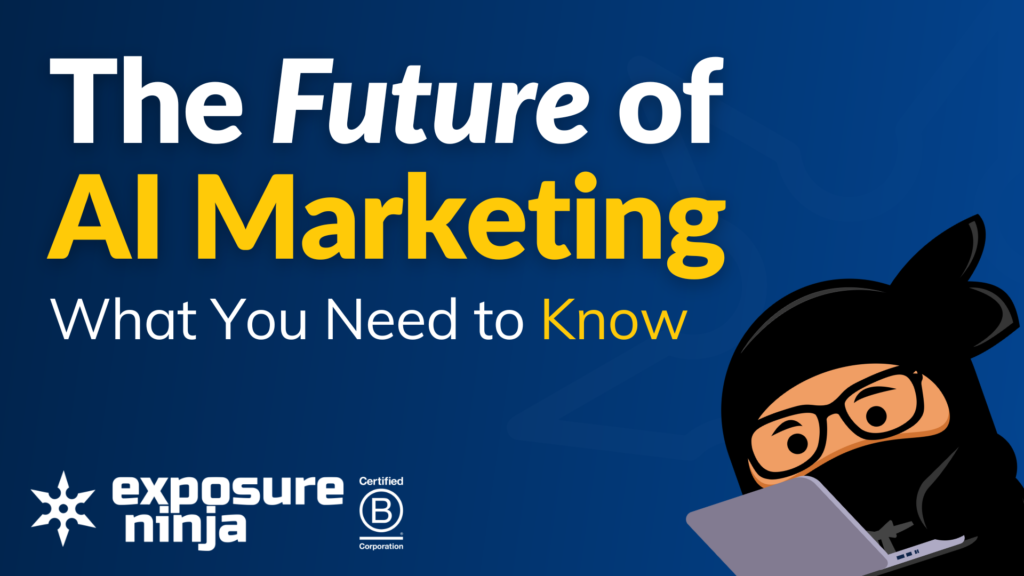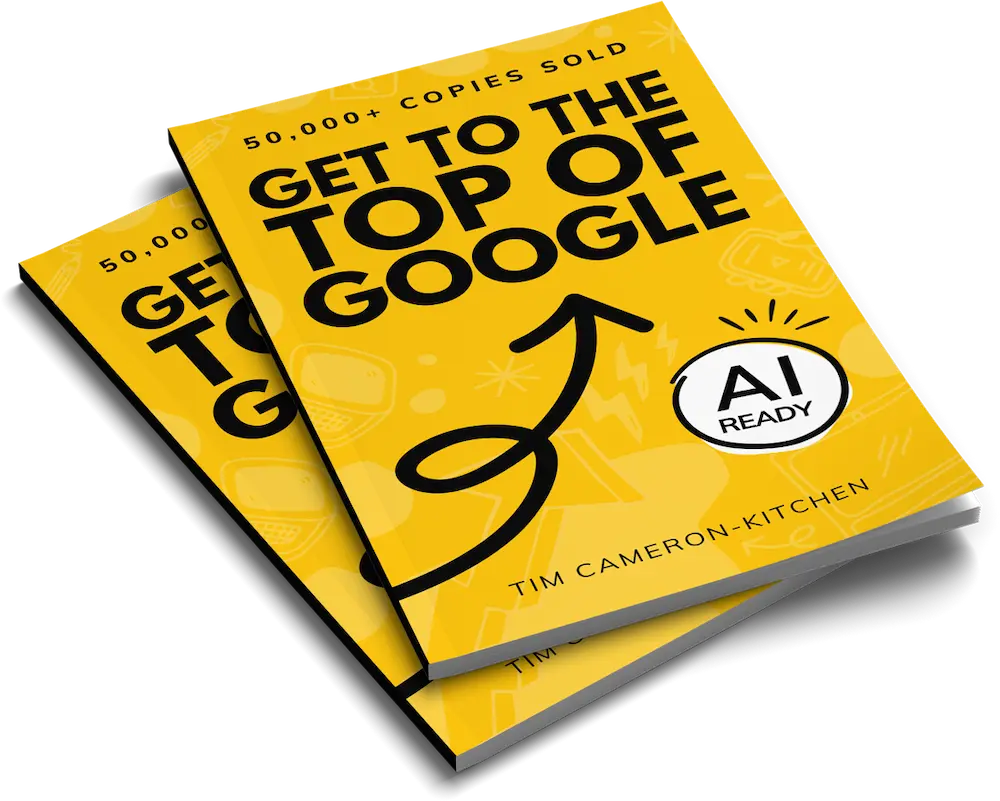
Get Weekly Marketing Tips
Join 30,000+ marketers and get the best marketing tips every week in your inbox
May 2024 Update – Google has officially released its Generative AI feature for its search engine, called AI Overviews (formerly the “Search Generative Experience” covered below). You can learn how AI Overviews work in this post: How To Rank in Google’s AI Overviews.
There’s a lot of news floating around about Google’s Gemini AI. We know it will impact marketers, but with the information out there at the moment, it’s difficult to understand how and why it will change the way we do marketing.
This guide explains what Google Gemini AI is and how it will affect marketing.
Key Google Gemini Insights for Marketers
In a rush? Here are the most important things marketers should know about Google Gemini. If you want to learn more about any of these areas, then keep reading.
What is Google Gemini?
Gemini is Google’s new large language model, which it will use to power its AI tools, including the Search Generative Experience and Bard.
What Are the Main Features of Google Gemini?
Gemini will be multimodal, meaning it can process images, videos and more alongside text. It will also have a better memory and be good at planning.
When Will Google Gemini Be Released?
Gemini does not have a specific release date, and it will likely be released in stages. This will impact tools like Google Bard and Search Generative Experience.
What Is Google Gemini?
Essentially, the task here is to explain the workings of a new type of brain that even the inventors (who happen to include some of the most intelligent humans alive) don’t truly understand.
But we’ve done a pretty darn good job of making information about Gemini accessible to marketers.
We’ve found some ways to explain it that make it slightly less confusing. There’s going to be a lot of jargon here, which we try to avoid, but some topics need it. There will be explanations for every acronym and jargon-y word.
If you’re new to AI, check out our guide, which includes a handy list of common AI terms.
Struggling to know how to use AI with your marketing?
Download a free copy of AI Marketing: Everything You Need to Know and get immediately up-to-speed

Google Gemini is a new collection of large language models (LLMs), which Google is building to power its AI tools, much like how ChatGPT is powered by the GPT3.4 and GPT-4 large language models (and extensions, like DALL-E).
If you’re new to large language models, essentially, they’re super-smart computer programs that are really good with words and know a lot of things.
When we say “large,” we mean that this program has learned from many books, websites and other things people have written.
The most popular AI tools right now are generative AI chatbots. You can ask them questions, and they will try to give you answers. They can also write stories, offer advice or chat with you about all sorts of topics. Because of this, tools that use LLMs are great assets for marketers.
The screenshot below shows Bard, Google’s generative AI chatbot.
So what makes Google Gemini different from the existing LLMs that power tools like ChatGPT, Bard and BingChat?
Starting with Bard. It won’t replace Bard, as it’s not a competitor. It’ll be one of the things that powers Bard, meaning Bard will be able to give better answers to users. The same goes for Google’s Search Generative Experience (SGE).
Gemini is sort of like the fuel for Bard and SGE.
It stands out from GPT-4, which is the LLM that ChatGPT and Bing Chat work off (are you keeping up with all these names?) because of the huge amount of things it can do.
According to Google, Gemini is still in training, but the aim is for it to be “multimodal, highly efficient at tool and API integrations and built to enable future innovations, like memory and planning”.
It does this by processing data taken across services, including Google Search, YouTube, Google Books, and Google Scholar.
“That’s great”, we hear you say. “But what does that actually mean? What can it do? Will it impact SEO? And how will it impact marketers?”
What Can Google Gemini Do?
There’s a lot that Google Gemini can do to help marketers by improving Google’s AI tools and search.
But the way Google has explained this isn’t ideal.
Using words like “multimodal” isn’t super accessible to most marketers, so let’s break this down for you.
Multimodal
Multimodal, in very simple terms, means that Gemini can “see” a bunch of different stuff.
If you show it text, it can understand it. If you show it an image, it can understand it. If you show it a video, it can understand that, too.
Thanks to Google images and YouTube (also owned by Google), the tech giant has a huge pool of data to use to train Gemini.
This is what makes it multimodal. If Gemini could only process text, then it wouldn’t be multimodal.
Not only can it understand text, images, and videos; when a multimodal is generative, it can create images, text, (and gradually, as the technology improves) video too.
There are two distinct ways that this can help marketers.
The first is helping with content generation.
According to Google, this will allow for more natural conversations with Bard or other Google AI chatbots.
In the future, it’s expected to be able to use memory to advise you (current chatbots are quite limited in their memory), and it should be able to help you with planning too.
But we decided to think about things on an even bigger scale.
Lots of existing AI tools can help you generate text, images, or video, but it’s not often that one AI tool will do all of these. Then you have issues with the quality.
So, instead of getting the AI to create the work for you, you could work collaboratively with them, using them as an assistant. (which is how you should be using AI tools now, rather than just taking what they say word for word).
With Gemini, it’s likely you’ll be able to create a design for a landing page, for example, and show it to Google Bard and get feedback from the AI on how well-optimised it is for conversions.
- It might suggest that you adjust the padding on the page or move the CTA to a more optimal position based on its research of other landing pages.
- You could even ask it to watch a promotional video you’ve created and get feedback on how strong your hook, pacing and graphics are.
ChatGPT has begun offering something similar.
The downside of this is that now it will be easier than ever for your competitors to produce higher-quality marketing. Perhaps right now, you have the competitive edge because you have the most user-friendly design, but in the future, it will be more difficult to stand out.
We’re potentially still a bit far off from when these tools will be available to everyone and work to their full potential, but these are just some of the ways we see the multimodal side of Gemini impacting marketers.
The other area it will impact is SEO.
Since it will power Google’s Search Generative Experience, it’s likely it will use its ability to “look” at images and videos to influence the generated response it gives to searchers.
It may be able to find the perfect image someone is searching for or find a video about the weird thing they’re describing.
If we want to think about this on a whole other level, it’s possible that Gemini will be able to “look” at websites in order to determine their quality and their position in the Google Search results. Now, wouldn’t that be something?
It won’t just power SGE, but it will also impact it.
The AI-generated result that appears at the top of the search in SGE will become more accurate and helpful to the user.
This means that the number of website visits in a user’s journey will decrease even more. We predict it will go from around eight website visits to potentially as low as three, depending on the type of search.
You might be thinking that this means creating informational content for your website will be pointless, but we disagree.
Gemini will need to get the information that appears in SGE from somewhere. If it’s taking that information from your website, it’s more likely to credit you as a source.
But the decrease in traffic still means that you’ll want to use other content sources to boost your traffic.
This includes running digital PR campaigns and improving your social media presence.
Social media doesn’t just mean the likes of Instagram and Twitter — it also includes places like YouTube or industry-focused forums.
PPC will be another way you can boost your traffic when SGE gets fully rolled out. Google has been testing different ways we’ll see paid results in this new Google experience.
Thinkplus’s AI-forward founder, Tim Cameron-Kitchen, shares his thoughts on how Google Gemini will change SEO in this guide.
What Else Can Google Gemini Do?
The other features of Gemini that Google shared are in very early stages, so there’s less to say about them than the multimodal stuff.
Gemini will be able to integrate with tools and use APIs, which will mean integrating it into more of Google’s existing tools and platforms (Workspace, YouTube, Maps).
The LLM will also come in a number of different models or sizes, which means it will have more flexible uses.
If you only have a model that’s virtually the size of an elephant, but your project is the size of a thimble, you’ll have trouble fitting the elephant-sized LLM into it.
That’s a pretty chaotic metaphor, but it just means that projects that don’t need to use the biggest version of Gemini won’t be weighed down by it. They can use “lighter” models that do what they need.
Is your marketing underperforming?
Request a free website and marketing review and our team will tell you how to improve your marketing.


How to Access Google Gemini
Google Gemini doesn’t have an official “release” date or way you can access it. Instead, we can expect it to be added gradually to Google’s existing AI tools, like Bard and Search Generative Experience (SGE).
Right now, you can test out SGE if you sign up for the waiting list. Keep in mind that this is still an early work in progress, so it won’t always give perfect answers. Google expects to roll out Search Generative Experience to more users in early 2024.
Will Google Gemini Be Free to Use?
Most marketers won’t have to worry about paying for the use of Gemini. It will be used to power lots of Google’s free tools that use AI. The only people who may need to pay to use Gemini are developers using it in AI projects.
Is Google Gemini Better than ChatGPT?
The question on everyone’s lips (or at least, in their search bars, according to Also Asked) is this — is Google Gemini better than ChatGPT?
This is sort of a trick question, as Gemini and ChatGPT aren’t the same thing.
The real question is this: is Gemini better than OpenAI’s GPT-4?
The answer is a difficult one (sorry), but only because we haven’t been able to get a real, hands-on look at what Gemini can do.
But, from what the developers at Google are saying, it will be better than GPT-4 and, therefore, will make Bard better than ChatGPT.
No disrespect to OpenAI, though. They’ve really paved the way for the future of AI (generative AI specifically) and have pushed companies like Google to speed up the development of their own AI products.
Competition is healthy, and it will be interesting to see what OpenAI will do next with ChatGPT.
Google Gemini for Marketers
Google Gemini AI is a complicated topic. But it’s important that you understand what it is, at least a little bit, so that you can prepare for how it will impact your marketing.
- It’s likely Gemini will improve Google’s SGE, meaning more people will stay in the search results rather than visiting websites. This sounds bad — most websites will get less traffic — but the traffic you do get is likely to be more qualified.
- Gemini will improve Google Bard, which can be a handy brainstorming tool for marketers.
- In the future, it’s possible that AI tools using Gemini will be able to offer feedback on design and video work.
- There’s no sure release date for Google Gemini, but we can expect it to start being used for SGE and Bard in early 2024.
What to Read Next
- Learn more about the impact Gemini will have on marketers
- Get up to speed on the future of AI marketing.
What to Watch Next
- AI Tools Most Marketing and Sales Teams (Probably) Aren’t Using Yet
- 2023 Marketing Changes RANKED
- SGE: The Future of Google Search (How it Works and SEO Impact).





















